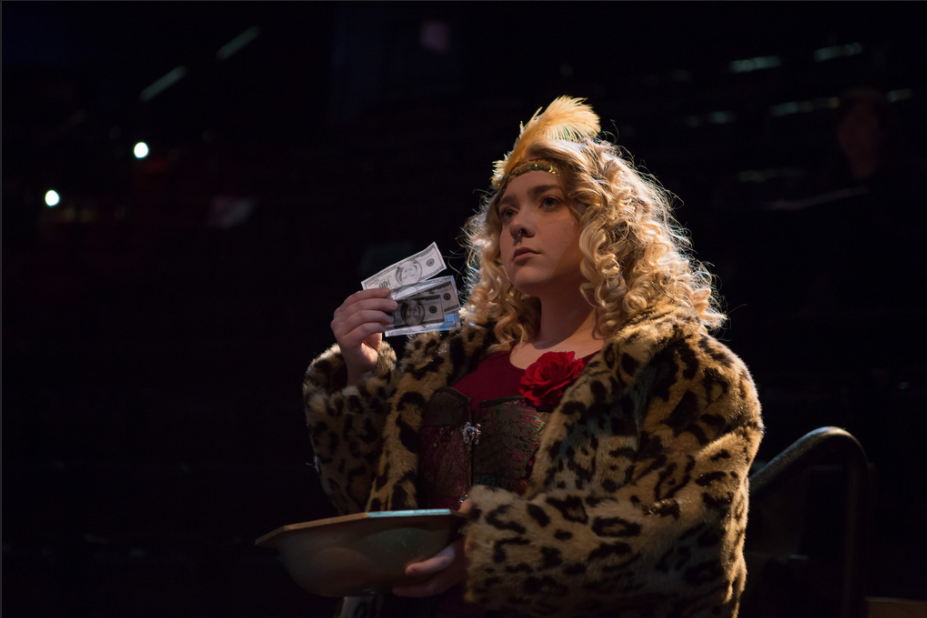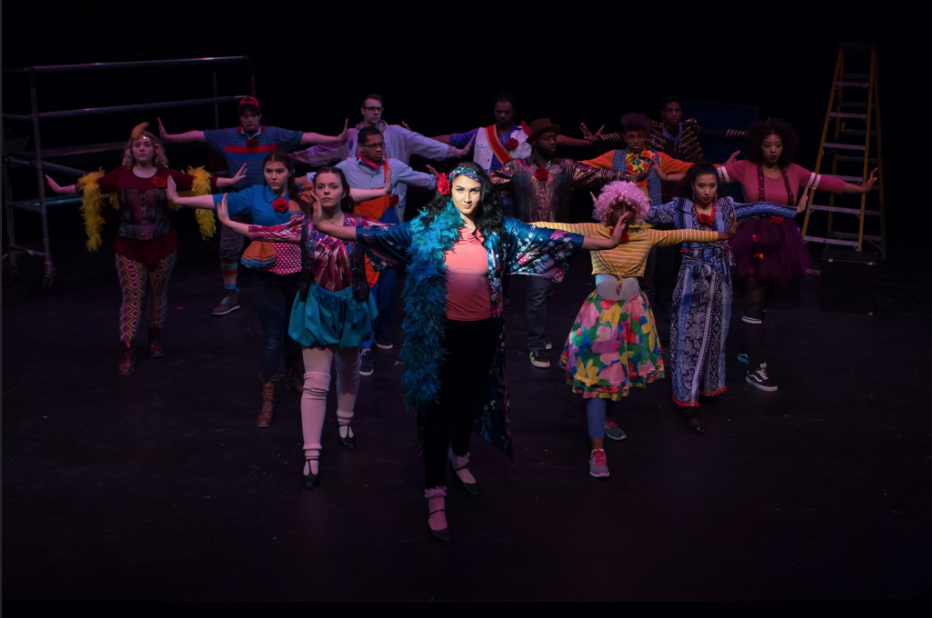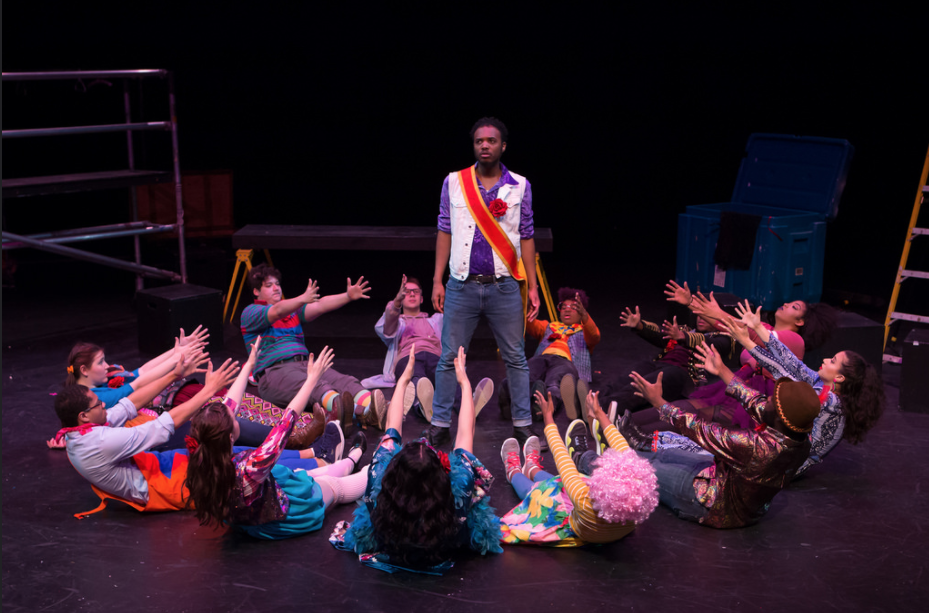
By Ryan McFadden
News Editor
Jesus Christ on a make-shift crucifix gazes toward blinding stage lights as a crowd stands before him. Jesus sings out “God, I am dying.” The people reply “God, you are dying.” He sings “God, I am dead.” They reply “God, you are dead.”
Disheartened expressions fade from the faces of a talented cast of college students. Smiles replace the pain and beautiful music breaks the silence.
The student performers have just begun the last scene of “Godspell,” performed in the Smith McFarland Theatre of East Stroudsburg University three weeks ago.
East Stroudsburg’s latest theatre production reworks bible stories centered around the life of Jesus into a musical play. The songs glorify the intentions of Christianity. The plotline shows its results remain to be seen. Most of the song lyrics were taken from traditional hymns, reinforcing the play’s gospel feel.
“Godspell” begins with Jesus’s entrance into a world threatened by miscommunication. Major conflict is introduced when Jesus’s followers pervert his teachings to pad their wallets.

Working together to make peace turns into selling morals to make money in “Godspell,” but again, the intentions are exalted while the results haven’t yet arrived.
“Theatre is often called ‘the collaborative art,’ so we as a group of theatre artists thought it would be fitting to produce this show at a time when society seems to want to do anything but collaborate,” said Director and East Stroudsburg University Professor Margaret J. Ball in the Director’s Note.
There are two main roles in “Godspell.” Jesus, and an ensemble of student performers representing a crowd, among them are John the Baptist and Judas. The crowd serves as amplification for a battle between love and hate, and peace and division.
The vocal talents of Rashiek Lauren as Jesus shines through the ample background music with an effortless force, and the rest of the ensemble does not disappoint through moving musical numbers.
“Godspell” begins with the “Tower of Babel.” The opening song has individual performers singing different phrases at the same time. Disorienting music demonstrates the famed communication breakdown symbolic of this bible story. It also reflects the difficulty found in building a community that is heavenlike for everyone.
That difficulty sets the stage for Christ’s entrance into a chaotic scene representing an uncoordinated world. The morals Jesus prescribes are the crowd’s chance to save themselves from their divisive nature.
In a tense moment between songs Jesus slaps a sinner across the face. When the sinner raises his hand to smack Jesus back in eye for an eye fashion, the ensemble gasps. The sinner turns his hand into a phone and pretends to take a call. Now under a divine thumb, the crowd sticks together.
An impersonation of President Trump serves as comic relief. Mrs. Trumples is the name of the character. The voice imitation is extremely funny and it broke the audience into laughter.
Mrs. Trumples’ dialogue suggests that President Trump is guilty of serving two masters. God and money. Jesus breaks in to say, “no servant can be the slave of two masters.”
The second act of “Godspell” contains the highest peak and lowest valley in the life of Jesus.
The ensemble carries baskets through the audience asking for money in a scene like Sunday mornings in Church. Advocating for tithes puts Jesus in a troubled light because the voices call out more frantically with each passing second.
The sight and sound of the ensemble now desperately begging for money gives the scene a wicked image. The believers begin falling victims to greed, betraying Christ’s intentions and sinning in his name.
Jesus grows more authoritative the further the crowd perverts his teachings. Eventually he breaks out in anger. He’s furious the people have built a temple to make a greedy profit rather than to serve God and so he rips it down.
The crowd’s failure to follow Jesus’s command and build a healthy community sets the stage for “Godspell”’s musical summation of the prescriptions of Christianity.
That summation is the powerful song, “Beautiful City.” It is used outside the theatre as an anthem when a city is experiencing great tragedy. The composer Stephen Schwartz re-wrote the lyrics after the Rodney King riots of 1993 and the song helped unite New York City after 9/11.

Schwartz, in his preface to the script, said, “‘Godspell’ is about the formation of a community which carries on Jesus’ teachings after he has gone. In other words, it is the effect Jesus has on the others which is the story of the show, not whether or not he himself is resurrected.”
“Therefore, it is very important at the end of the show that it be clear that the others have come through the violence and pain of the crucifixion sequence and leave with a joyful determination to carry on the ideas and feeling they have learned during the course of the show.”
The last supper gives Jesus an opportunity to predict his demise. He says that his followers will betray him. The crowd begins to slither around Jesus. They whisper questions that seem difficult to answer. They represent demonic temptations and to fight them Jesus relies on his moral guidance, leading him to the cross.
Raised on a make-shift crucifix Jesus calls out to God. Some believers claim not to know who he is. Others cry. Christ calls out “God, I am dead.” The ensemble replies “God, you are dead.” An eerie silence falls over the theatre.
A piercing phone alarm breaks the moment. Someone rustles in their seat, turning it off, cursing and saying, “why me?”
There is no resurrection in “Godspell” unless a reprise of “Beautiful City” is considered Christ’s victory over death. The ensemble sings the climatic song again without Jesus, representing one aspect of the Christian faith: the spirit of Christ lives on through the will of the people.

Rashiek Lauren walks back on stage to join the rest of the cast for a bow. The play is over. The question remains. Will anyone on Earth ever see the “Beautiful City?”
“Godspell” premiered Feb. 28 through Mar. 4 at the Fine and Performing Arts center’s Smith-McFarland Theatre at East Stroudsburg University.
Email Ryan at:
Rmcfadden5@live.esu.edu

